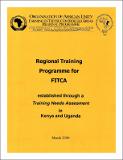| dc.description.abstract | A consultancy was commissioned in March 2000 to assess the needs for training at regional
level in the FITCA programme, before engaging in any training activity.
FITCA is a regional project for the East African countries Kenya, Uganda, Ethiopia and
Tanzania and will be joined by Rwanda and Burundi at a later stage. It has a regional Coordination Office in Nairobi at the offices of OAU/IBAR, the umbrella organisation of
FITCA. The objective of the regional component is amongst others, to offer training which is
beneficial to the national projects under FITCA.
At the time of this consultancy only Kenya was operational as a project and Uganda was
about to start with the Technical Assistant already in place. It is for this reason, that only
Kenya and Uganda were visited during the consultancy.
In order to design a training programme, the target group and its training needs need to be
identified. This was done through interviews with stakeholders in the programme, research
and training institutions, NGO's, study of project and related documents and through Training
Needs Assessment Workshops which were held in Kenya and Uganda. Participants of these
workshops represented the job categories which will implement FITCA project activities.
In Kenya the 2-day workshop was held in Busia where the Project Management Unit (PMU)
is based. Participants represented Government (Veterinarians, Zoologists, Agriculturists) and
Community based Organisations, the Kenya—Finland LDP and private Veterinarians and
Animal Health Assistants.
In Uganda the 2-day workshop was held in Jinja, where the PMU shall be located, once the
project starts. Participants represented Government (Headquarter, District level Veterinarians,
Entomologists, Sleeping Sickness Control Medics, Agriculturists). Although project
implementation will eventually be carried out also by the private sector, no representatives are
as yet involved in project preparation.
An approved methodology for the assessment of training needs was used, in which a duty and
task analysis of jobs was carried out. The skills required for these activities were then
identified. The next step of analysis was modified to fit the needs of FITCA. Instead of
comparing these skills with the participant's own job description, as usually done, they were
asked to compare the skills with their future role in FITCA and identify the knowledge gaps.
For a better understanding of this role FITCA activities and the human resource profile
required for implementation were elaborated. Participants were also asked to extend their
assessment to their subordinates, or, in the case of non-Government participants, to their
clients. The latter part of the exercise gave the required information to assume the needs of
job categories and beneficiaries, such as farmers, not present at the workshops.
Training needs were identified and ranked for priority for each job category. For the groups of
Animal health/disease control personnel, Rural development (crops and livestock) personnel
and Tsetse control personnel, the training needs in Kenya and Uganda were comparable and
common needs were listed. Although as groups not comparable because they featured only on
one workshop, the social and extension workers, the private entrepreneurs, SS control
personnel and managers also had certain training needs in common with the other groups. | |
